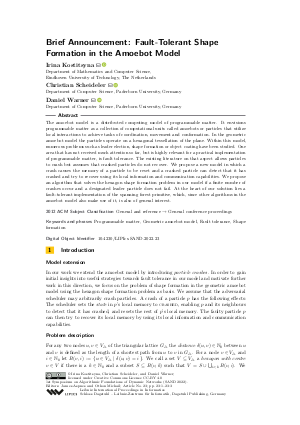Brief Announcement: Fault-Tolerant Shape Formation in the Amoebot Model
Authors
Irina Kostitsyna  ,
Christian Scheideler
,
Christian Scheideler  ,
Daniel Warner
,
Daniel Warner 
-
Part of:
Volume:
1st Symposium on Algorithmic Foundations of Dynamic Networks (SAND 2022)
Part of: Series: Leibniz International Proceedings in Informatics (LIPIcs)
Part of: Conference: Symposium on Algorithmic Foundations of Dynamic Networks (SAND) - License:
 Creative Commons Attribution 4.0 International license
Creative Commons Attribution 4.0 International license
- Publication Date: 2022-04-29
File

PDF
LIPIcs.SAND.2022.23.pdf
- Filesize: 3.84 MB
- 3 pages
Document Identifiers
Subject Classification
ACM Subject Classification
- General and reference → General conference proceedings
Keywords
- Programmable matter
- Geometric amoebot model
- Fault tolerance
- Shape formation
Metrics
- Access Statistics
-
Total Accesses (updated on a weekly basis)
0Document
0Metadata
Abstract
The amoebot model is a distributed computing model of programmable matter. It envisions programmable matter as a collection of computational units called amoebots or particles that utilize local interactions to achieve tasks of coordination, movement and conformation. In the geometric amoebot model the particles operate on a hexagonal tessellation of the plane. Within this model, numerous problems such as leader election, shape formation or object coating have been studied. One area that has not received much attention so far, but is highly relevant for a practical implementation of programmable matter, is fault tolerance. The existing literature on that aspect allows particles to crash but assumes that crashed particles do not recover. We propose a new model in which a crash causes the memory of a particle to be reset and a crashed particle can detect that it has crashed and try to recover using its local information and communication capabilities. We propose an algorithm that solves the hexagon shape formation problem in our model if a finite number of crashes occur and a designated leader particle does not fail. At the heart of our solution lies a fault-tolerant implementation of the spanning forest primitive, which, since other algorithms in the amoebot model also make use of it, is also of general interest.
Cite As Get BibTex
Irina Kostitsyna, Christian Scheideler, and Daniel Warner. Brief Announcement: Fault-Tolerant Shape Formation in the Amoebot Model. In 1st Symposium on Algorithmic Foundations of Dynamic Networks (SAND 2022). Leibniz International Proceedings in Informatics (LIPIcs), Volume 221, pp. 23:1-23:3, Schloss Dagstuhl – Leibniz-Zentrum für Informatik (2022)
https://doi.org/10.4230/LIPIcs.SAND.2022.23
BibTex
@InProceedings{kostitsyna_et_al:LIPIcs.SAND.2022.23,
author = {Kostitsyna, Irina and Scheideler, Christian and Warner, Daniel},
title = {{Brief Announcement: Fault-Tolerant Shape Formation in the Amoebot Model}},
booktitle = {1st Symposium on Algorithmic Foundations of Dynamic Networks (SAND 2022)},
pages = {23:1--23:3},
series = {Leibniz International Proceedings in Informatics (LIPIcs)},
ISBN = {978-3-95977-224-2},
ISSN = {1868-8969},
year = {2022},
volume = {221},
editor = {Aspnes, James and Michail, Othon},
publisher = {Schloss Dagstuhl -- Leibniz-Zentrum f{\"u}r Informatik},
address = {Dagstuhl, Germany},
URL = {https://drops.dagstuhl.de/entities/document/10.4230/LIPIcs.SAND.2022.23},
URN = {urn:nbn:de:0030-drops-159656},
doi = {10.4230/LIPIcs.SAND.2022.23},
annote = {Keywords: Programmable matter, Geometric amoebot model, Fault tolerance, Shape formation}
}
Author Details
- Department of Mathematics and Computer Science, Eindhoven University of Technology, The Netherlands
References
-
Zahra Derakhshandeh, Robert Gmyr, Andréa W Richa, Christian Scheideler, and Thim Strothmann. An algorithmic framework for shape formation problems in self-organizing particle systems. In Proceedings of the Second Annual International Conference on Nanoscale Computing and Communication, pages 1-2, 2015.

